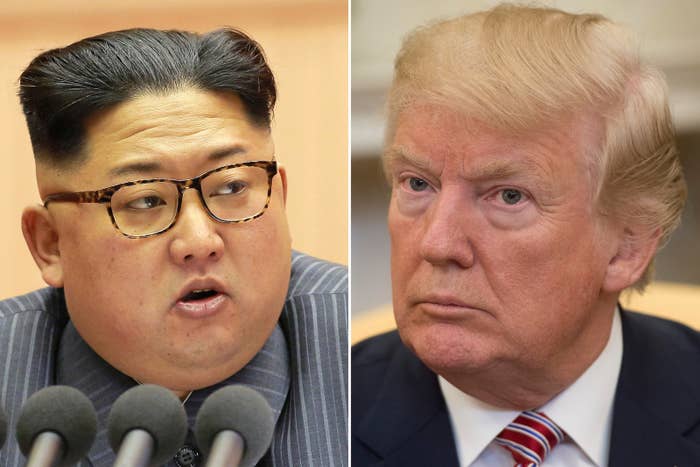
Donald Trump’s acceptance of an invitation to meet with Kim Jong Un is being treated like another abrupt and risky turnaround by an impulsive president. But critics need to recognize that far from being a reward handed to Kim, this meeting gives new momentum to negotiations. And on the perilous road of confrontation that the United States and North Korea have hurtled down since Trump took office, negotiations are the only off ramp.
However risky a summit may be, it poses much less risk than stumbling into war. The mere prospect of a meeting removes that risk for the foreseeable future, which is a major relief for South Korea, whose president deserves credit for his steadfast engagement of the North despite carping from his critics.
The Trump administration is insisting that its campaign of maximum pressure was what brought North Korea to the negotiating table, but there was one other move by the president that was at least as important: his willingness to drop all preconditions for talks. Instead, he accepted a promise from Kim to halt nuclear and missile tests — and won't meet if that promise is not kept.
That willingness to drop preconditions has shocked many observers, who are today reacting to the news by saying the president has foolishly granted a meeting without extracting anything meaningful in return. But this reaction is a reminder of how little attention has been paid to Trump’s oft-expressed desire to negotiate with the North Korean leader, which came up frequently during and after his presidential campaign.
The media mostly overlooked this, and was instead preoccupied with the back-and-forth insults between Trump and Kim and the talk of war — which the North dismissed as mere bluff.
Instead, North Korean diplomats paid close attention to his repeated references to negotiating, and began sending signals of their own. Most visibly, the country’s easing of tensions with the South in the lead-up to the Winter Olympics — and its participation in those games — were seen by some of us who watch the region closely as a sign that the regime wanted to reach out. Today, we are seeing the results.
The top priority of this meeting must be sustaining Kim’s promised temporary suspension of nuclear and missile testing “while dialogue continues,” and extending it to fissile material production. A commitment by the United Stated to end enmity and reconcile with the North could open the way – a pledge Washington has made in the past but failed to follow up, leading past deals to collapse.
Yet getting this done — and pulling off the necessary and difficult verification of any commitment to suspend nuclear work — will take the kind of experienced negotiators that the seriously understaffed Trump administration currently lacks. The top US diplomat in charge of North Korea policy, Joseph Yun, had been skillfully talking to the North Koreans for the past year until he abruptly retired in late February. Persuading him to reverse his resignation should be a high priority.
Both countries could improve the atmosphere for talks by making relatively simple gestures — North Korea could resume the search for the remains of U.S. troops missing in action from the Korean War, or release Americans being held in its prisons, while the U.S. could send even a token amount of humanitarian aid through the World Food Program. Secretary of State Rex Tillerson could get things moving by meeting with his North Korean counterpart.
Just as Trump has often expressed an interest in talks, Kim Jong Un’s willingness to meet with the US president is also not a new development, and neither are the outlines of what Kim may be willing to negotiate over.
In his New Year’s Day speech he hinted that by nuclear testing could stop now that North Korea has the rudiments of an ICBM and a thermonuclear weapon. He also called on South Korea to end “nuclear war exercises” with the United States, implying that the joint military exercises could continue if nuclear assets were excluded. This week, he told the South Korean envoys he saw “no reason” for his country to maintain a nuclear arsenal “as long as military threats to the North are eliminated and the regime’s security is guaranteed.”
That is a tall order to fill, and it will take take years for the US and its allies to convince Kim Jong Un that his regime is safe from outside threats. But now is the time to get started and test if he really means what he says.
Leon V. Sigal is director of the Northeast Asia Cooperative Security Project at the Social Science Research Council in New York.
